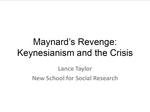Maynard's Revenge: Keynesianism and the Crisis

Lance Taylor
presented at: Maynard's Revenge: The Collapse of Free Market Macroeconomics (26 May 2010)
It is now widely agreed that mainstream macroeconomics is irrelevant and that there is need for a more useful and realistic economic analysis that can provide a better understanding of the ongoing global financial and economic crisis. Lance Taylor's presentation, based on his forthcoming book, exposes the unrealistic assumptions of the rational expectations and real business cycle approaches and of mainstream finance theory. It argues that in separating monetary and financial behaviour from real behaviour, they do not address the ways that consumption, accumulation, and the government play in the workings of the economy. Taylor argues that the ideas of J. M. Keynes and others provide a more useful framework both for understanding the crisis and for dealing with it effectively. Keynes's basic points were fundamental uncertainty and the absence of Say's Law. He set up machinery to analyse the macro economy under such circumstances, including the principle of effective demand, liquidity preference, different rules for determining commodity and asset prices, distinct behavioral patterns of different collective actors, and the importance of thinking in terms of complete macro accounting schemes. Economists working in this tradition also worked out growth and cycle models. Employing these ideas throughout Maynard's Revenge, Taylor provides an analytical narrative about the causes of the crisis, and suggestions for dealing with it.
Lance Taylor is Arnhold Professor of International Cooperation and Development, New School for Social Research. He received a BS degree with honors in mathematics from the California Institute of Technology in 1962 and a PhD in economics from Harvard University in 1968. Lance Taylor then became a professor in the economics departments at Harvard and the Massachusetts Institute of Technology, as well as being a visiting professor at the University of Minnesota, the Universidade da Brasilia, Delhi University, and the Stockholm School of Economics. He moved to the New School in 1993. He has published widely in the areas of macroeconomics, development economics, and economic theory. Taylor has been a visiting scholar or policy advisor in over 25 countries including Chile, Brazil, Mexico, Nicaragua, Cuba, Russia, Egypt, Kuwait, Tanzania, Zimbabwe, South Africa, Pakistan, India, and Thailand. His recent books include: Varieties of Stabilization Experience, Oxford: Clarendon Press, 1988; Income Distribution, Inflation, and Growth: Lectures on Structuralist Macroeconomic Theory, Cambridge, MA: MIT Press, 1991; The Rocky Road to Reform: Adjustment, Income Distribution, and Growth in the Developing World, Cambridge MA: MIT Press, 1993; The Market Meets its Match: Restructuring the Economies of Eastern Europe (with Alice Amsden and Jacek Kochanowicz), Cambridge MA: Harvard University Press, 1994; Global Finance at Risk: The Case for International Regulation (with John Eatwell), New York NY: The New Press, 2000; External Liberalization, Economic Performance, and Social Policy, New York NY: Oxford University Press, 2001; Reconstructing Macroeconomics: Structuralist Proposals and Critiques of the Mainstream, Cambridge MA: Harvard University Press, 2004; External Liberalization in Asia, Post-Socialist Europe, and Brazil, New York NY: Oxford University Press, 2006; Maynard's Revenge: The Collapse of Free Market Macroeconomics, Cambridge MA: Harvard University Press, 2010.
Lance Taylor is Arnhold Professor of International Cooperation and Development, New School for Social Research. He received a BS degree with honors in mathematics from the California Institute of Technology in 1962 and a PhD in economics from Harvard University in 1968. Lance Taylor then became a professor in the economics departments at Harvard and the Massachusetts Institute of Technology, as well as being a visiting professor at the University of Minnesota, the Universidade da Brasilia, Delhi University, and the Stockholm School of Economics. He moved to the New School in 1993. He has published widely in the areas of macroeconomics, development economics, and economic theory. Taylor has been a visiting scholar or policy advisor in over 25 countries including Chile, Brazil, Mexico, Nicaragua, Cuba, Russia, Egypt, Kuwait, Tanzania, Zimbabwe, South Africa, Pakistan, India, and Thailand. His recent books include: Varieties of Stabilization Experience, Oxford: Clarendon Press, 1988; Income Distribution, Inflation, and Growth: Lectures on Structuralist Macroeconomic Theory, Cambridge, MA: MIT Press, 1991; The Rocky Road to Reform: Adjustment, Income Distribution, and Growth in the Developing World, Cambridge MA: MIT Press, 1993; The Market Meets its Match: Restructuring the Economies of Eastern Europe (with Alice Amsden and Jacek Kochanowicz), Cambridge MA: Harvard University Press, 1994; Global Finance at Risk: The Case for International Regulation (with John Eatwell), New York NY: The New Press, 2000; External Liberalization, Economic Performance, and Social Policy, New York NY: Oxford University Press, 2001; Reconstructing Macroeconomics: Structuralist Proposals and Critiques of the Mainstream, Cambridge MA: Harvard University Press, 2004; External Liberalization in Asia, Post-Socialist Europe, and Brazil, New York NY: Oxford University Press, 2006; Maynard's Revenge: The Collapse of Free Market Macroeconomics, Cambridge MA: Harvard University Press, 2010.